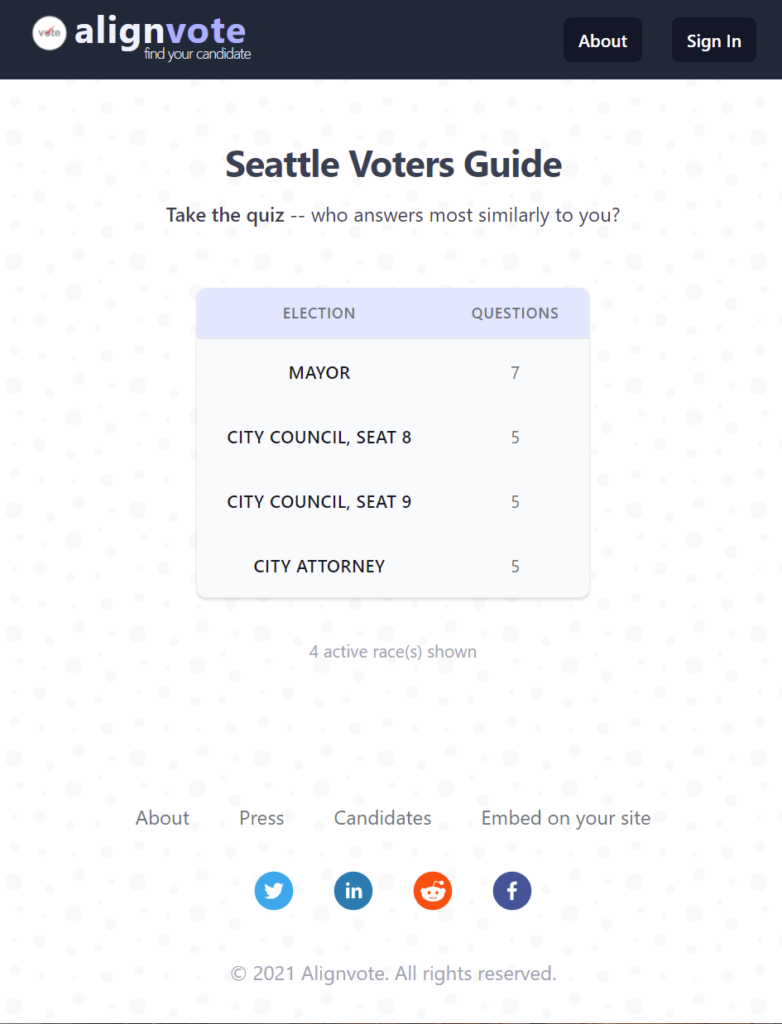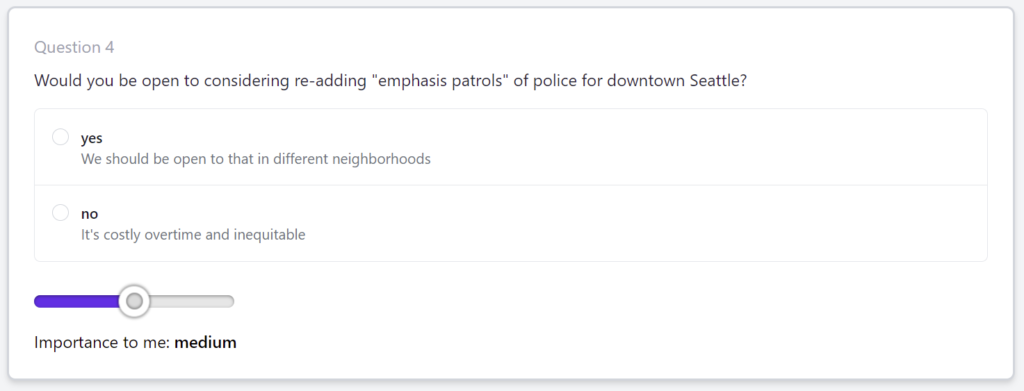I’ve just released a brand new version of Alignvote, completely rewritten and updated for the 2021 November Seattle General Election:
There are four voter-candidate matchmakers for key Seattle races: Mayor, City Council 8, City Council 9, and City Attorney. And, assuming forums and questionnaires continue to develop in the race for King County Executive, there will likely be one for that race soon as well.
Are you just getting up to speed on some of the big issues in these races, and curious where the candidates stand on some key questions? Drop by Alignvote, and take the quiz. Then share it with your friends.

Questions are sourced from candidate forums, direct questions placed to the candidates, and their positions as outlined on their campaign websites, on-the-record statements and elsewhere.
Know any undecideds?
In a poll released today, some 65% of voters were undecided in the City Attorney race, and 27% were undecided for Mayor:

All candidates were notified last Thursday and invited to provide additional elaboration if they’d like.
New Features
- The voter-candidate matchmaker is now embeddable on any website, and I’d be happy to have this embedded on your site or blog. If you have a news site or blog covering city politics or the Seattle election, grab the snippet of code to embed the Alignvote Quiz on your website.
- There’s a new “Evidence” section at the end of the stack-rankings. That section will include links to relevant news stories, tweets, commentary and more which are directly related to the candidate’s own views on the question at hand. This will likely be growing between now and November. If you have relevant stories or links to include, jot a tweet or Direct Message to @alignvote on Twitter.
- Easier administration. A great deal of the effort was put into easier administration on the back-end. I have rewritten the code entirely from Angular/Material to React/NextJS.
On Controversy and Bias
In the 2019 cycle, Alignvote delivered over 20,000 voter-candidate rankings, and certainly generated some controversy.
Alignvote measures the level of match between you and the eight candidates in the four races above. You and the candidate are answering the same question. Alignvote simply scores the distance, weighted by the importance that you assign on these questions. The candidate with the least overall distance, weighted by importance to you on each issue, comes out on top.
How are questions sourced? Of course, these aren’t the only questions which should matter to a voter, but they are ones where the candidates often have differing viewpoints and ones in which they have made their stances clear.
As for me, the guy behind this project, like all voters and writers, I have political views. I have expressed them here on my blog, and I will continue to do so. I am not unbiased. My own views may not match your own. This is true of any blogger, tweeter, activist-blogger, TV personality or mainstream journalist covering politics.
For what it’s worth, on political quizzes and by Gallup polling, I generally score as a centrist, and I have supported Democratic, Independent and Republican candidates with varying ideologies over the years. And, since it seems a highly relevant indicator to Seattleites, I’ve never voted for Trump.
But I also realize that the term “centrist” is a subjective label. I value great public schools, affordable and convenient transit options, help for those who need it, good and accountable government, green parks, limits on services for those who refuse to partner, transparent metrics for the public which funds services, more affordable housing inventory, better solutions for those experiencing mental health or substance use crises in their lives and improved health and environmental outcomes for all.
I think that’s in part because (a) some political writers/tweeters with relatively large followings really, really don’t like when policy tradeoff questions are framed in any other terms other than the favorable ones they prefer, and (b) many candidates like to “tack toward the center” in the general and therefore do not want to be pinned down in multiple-choice options. They want the freedom to be all things to all voters for a general election.
But leadership, including civic leadership, is often about tradeoffs. If there were solutions to long-term controversies that had easy “no cost” answers, they’d have been done by now.
I think voters deserve more clarity.
To be sure, the selection of any set of questions in any poll or survey or candidate forum can absolutely result in bias.
Controversial issues can be framed in a number of ways.
Alignvote simply shows the level of match between you and the candidates on the questions. There are many opportunities to hear open-ended answers to questions (interviews, forums, meet-and-greets and more.) By design, to help voters quickly identify closest-match-to-them, Alignvote relies upon closed-ended questions, where both you and the candidate must commit to one of the answers.
And Alignvote offers candidates an option to elaborate on why they chose the option they did. Campaigns were all emailed these questions for elaboration on Thursday, September 23rd, and I would be happy to put their elaborations in for voters to hear. (They should allow up to 72 hours for their elaborations to go live.)
Find it useful? Share it, and follow on social media.
I’m very gratified to hear directly from many of you that it’s been very helpful. It’s an entirely free civic project, and is not funded by any campaign or political organization — its very modest costs are solely funded by me.
If you like it, please share it with fellow Seattleites. Options include email, Twitter, Facebook, Nextdoor, Reddit and word of mouth. Or just jot me a follow on social media. You’ll find me at @stevemur and alignvote at @alignvote. And please vote in November!
photo credit: Nitish Meena

